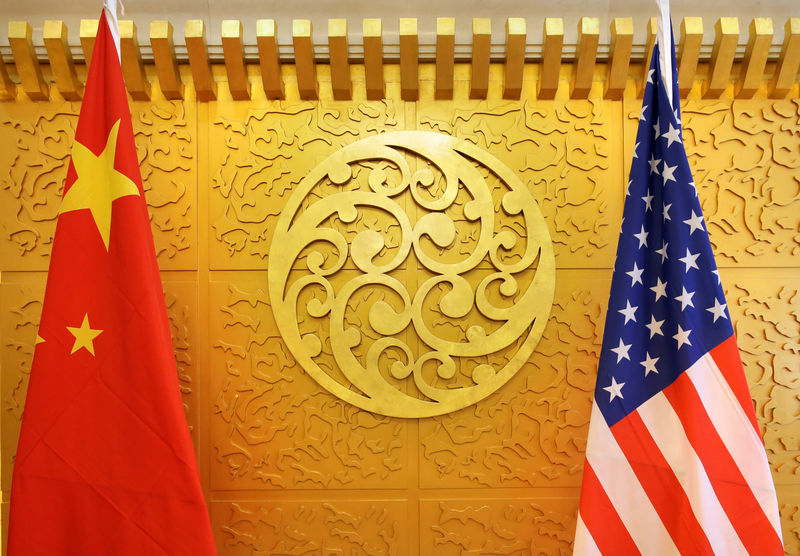(Bloomberg) -- The U.S. and China are still far apart on economic and trade questions, with recent statements from both sides showing just how big that gap remains.
China’s ambassador to Washington said over the weekend that Beijing wants the U.S. to stop restrictions and sanctions against its companies, outlining some of the Asian nation’s demands for future talks. That was in response to U.S. Trade Representative Katherine Tai’s comments before her call with Vice Premier Liu He, in which the U.S. raised concerns about China’s state-led support for businesses.
Beijing wants the U.S. to rectify problems such as the increasing difficulty Chinese companies have investing or listing in the U.S. and the restrictions placed on more than 900 Chinese entities, Ambassador Qin Gang told Phoenix TV in an interview, according to a summary on the embassy’s website. In particular, restrictions due to “national security” are unfair, Qin said, warning of serious consequences if this continued.
The U.S. is still ramping up restrictions and enforcement on Chinese firms, recently suspending new initial public offerings of China-based companies and demanding that those already listed in the U.S. submit to more scrutiny or face being delisted.
Trade Deal
On the trade deal signed last year, the two sides have opposing views on whether China is living up to its end of the bargain. The deal called for Beijing to make changes to regulations on intellectual property and other areas, and had specific targets for Chinese purchases of U.S. goods. Bloomberg calculations show that China has only bought half of the goods it promised to purchase so far.
Qin rejected accusations that China has failed to adhere to the agreement, arguing that the country has made “tangible” steps and “sincerely and steadily” implemented the accord.
However, U.S. Commerce Secretary Gina Raimondo said last month China isn’t abiding by commitments to buy goods, noting that Beijing is preventing the nation’s airlines from buying “tens of billions of dollars” of Boeing (NYSE:BA) Co. planes. U.S. Trade Representative Katherine Tai said last week the administration would work to enforce China’s commitments in the trade deal.
Industrial Policy
The U.S. has long-standing concerns about the state-controlled structure of China’s economy and subsidies, and has repeatedly raised what a senior U.S. official last week called China’s “unfair, non-market practices.” Those issues were part of the negotiations under the Trump administration, although they weren’t included in the 2020 trade deal.
The U.S. has continued to try and discuss this with China and is also weighing a new investigation into Chinese subsidies as a way to pressure Beijing on trade, people familiar with the matter told Bloomberg last month.
Read more: U.S.-China Trade Booms as If Virus, Tariffs Never Happened
In her call with China’s vice premier last week, Tai “emphasized U.S. concerns relating to China’s state-led, non-market policies and practices that harm American workers, farmers and businesses,” according to the U.S. readout of the conversation.
However, there’s no sign that China is willing to make changes. The topic wasn’t in China’s official statement on the Tai-Liu discussion, which instead said that Liu made clear Beijing’s position “on issues including China’s economic development model and industry policies,” and requested the U.S. get rid of all the tariffs and sanctions.
Read more: U.S. Trade Representative Tai, China’s Liu Discuss Trade
The U.S., in turn, didn’t mention discussing dropping tariffs in its statement. While the U.S. announced it would start a new process to exclude some imports from being suhected to duties, there’s no indication that it plans to permanently lift any of the other taxes on Chinese goods. And the reported investigation into Chinese industrial policy could lead to even more tariffs.
Presidents Xi Jinping and Joe Biden spoke by phone last month and there are reports they will have a virtual meeting in coming months, but both sides continue to put the onus for improving relations on the other.
For the U.S., China should change the “practices that do harm to American firms and workers,” according to a senior government official. For China, the U.S. should “do more things conducive to the sound and steady development of China-U.S. economic and trade ties,” Ministry of Foreign Affairs Spokesman Zhao Lijian said last week.
There’s no public sign of those parallel tracks merging anytime soon.
©2021 Bloomberg L.P.
